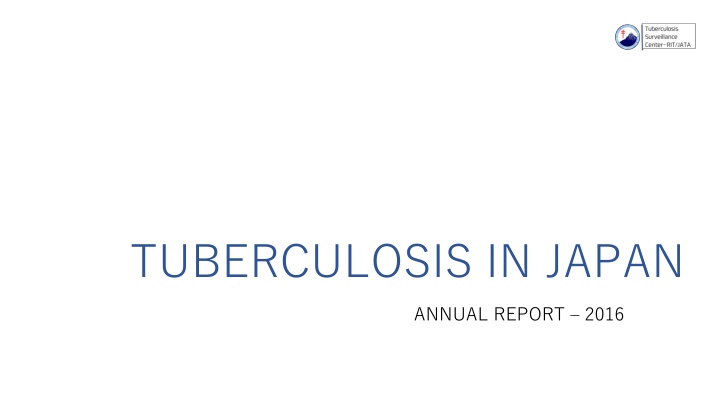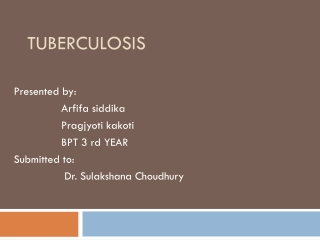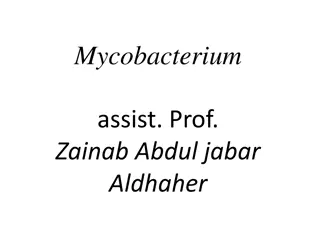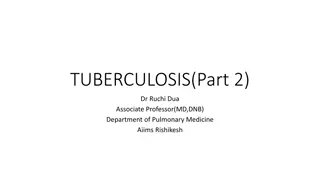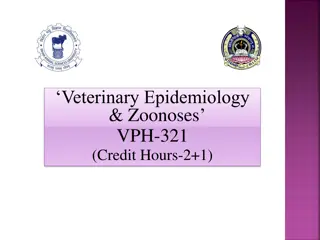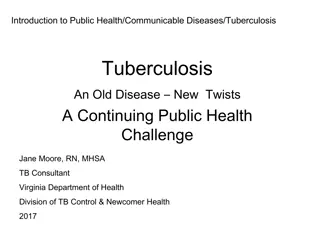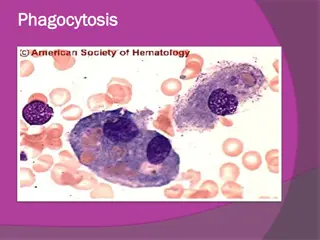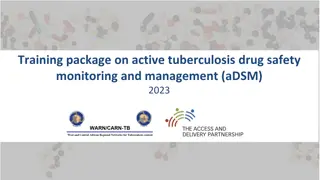Tuberculosis in Japan: Annual Report 2016 Insights and Trends
Delve into the Tuberculosis Annual Report 2016 for Japan to explore key statistics, disease notifications, demographics, and trends including foreign-born cases, HIV testing results, drug susceptibility, and more. The report provides a comprehensive analysis of TB cases, age groups affected, geographical distribution, and associated health conditions like diabetes mellitus.
Download Presentation

Please find below an Image/Link to download the presentation.
The content on the website is provided AS IS for your information and personal use only. It may not be sold, licensed, or shared on other websites without obtaining consent from the author.If you encounter any issues during the download, it is possible that the publisher has removed the file from their server.
You are allowed to download the files provided on this website for personal or commercial use, subject to the condition that they are used lawfully. All files are the property of their respective owners.
The content on the website is provided AS IS for your information and personal use only. It may not be sold, licensed, or shared on other websites without obtaining consent from the author.
E N D
Presentation Transcript
TUBERCULOSIS IN JAPAN ANNUAL REPORT 2016
Fig 2. Number of TB cases by selected age groups, 2000- 2015
Fig 3. Proportions of pulmonary and extra-pulmonary diseases by age groups, 2015 PTB bac+: bacteriologically confirmed pulmonary tuberculosis, PTB clin: clinically confirmed pulmonary tuberculosis, ExPTB: extra-pulmonary tuberculosis
Fig 6. Foreign-born TB cases by selected countries of birth, 2007-2015
Fig 8. Newly notified cases by DM status, 2008-2015 DM: diabetes mellitus
Fig 9. Number of culture confirmed PTB cases and of those whose DST results were known, 2007-2015 PTB : pulmonary tuberculosis, DST: drug susceptibility test
Fig 10. Drug susceptibility test results, 2007-2015 MDR: multi-drug resistance, INH res: isoniazid resistant, RFP res: rifampicin resistant
Fig 11. Proportion of those with delay among pulmonary cases, by age groups, 2015 Patient delay: time between onset of symptoms and initial doctor visit being longer than 2 months, Doctor delay: time between initial doctor visit and diagnosis being longer than 1 month Total delay: time between onset of symptoms and TB diagnosis being longer than 3 months
Fig 12. Proportion of those with delay among sputum smear positive pulmonary cases, by age groups, 2015 Patient delay: time between onset of symptoms and initial doctor visit being longer than 2 months, Doctor delay: time between initial doctor visit and diagnosis being longer than 1 month Total delay: time between onset of symptoms and TB diagnosis being longer than 3 months
Fig 13. Proportion of those with delay among extra-pulmonary cases, by age groups, 2015 Patient delay: time between onset of symptoms and initial doctor visit being longer than 2 months, Doctor delay: time between initial doctor visit and diagnosis being longer than 1 month Total delay: time between onset of symptoms and TB diagnosis being longer than 3 months
Fig 14. Treatment outcome of new sputum smear positive cases by age groups (2014 cohort) Age groups
Fig 15. Treatment outcome of new sputum smear positive pulmonary cases aged 49 and below, 2007- 2014
